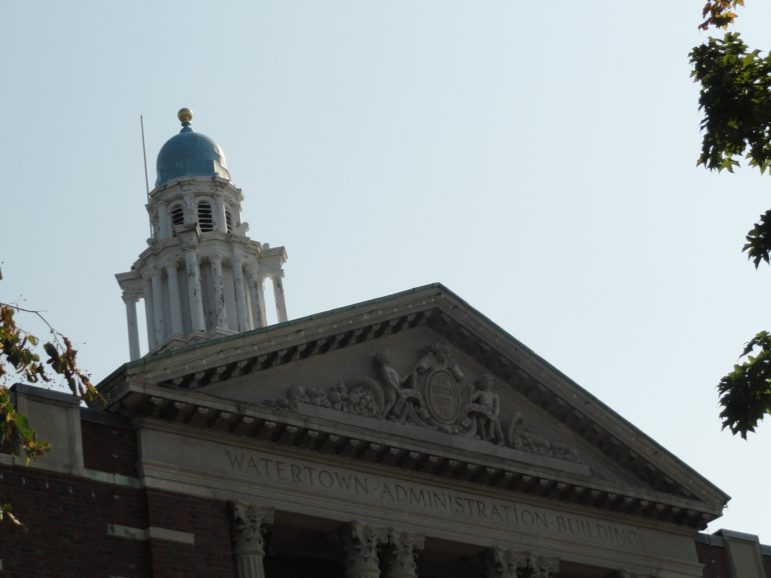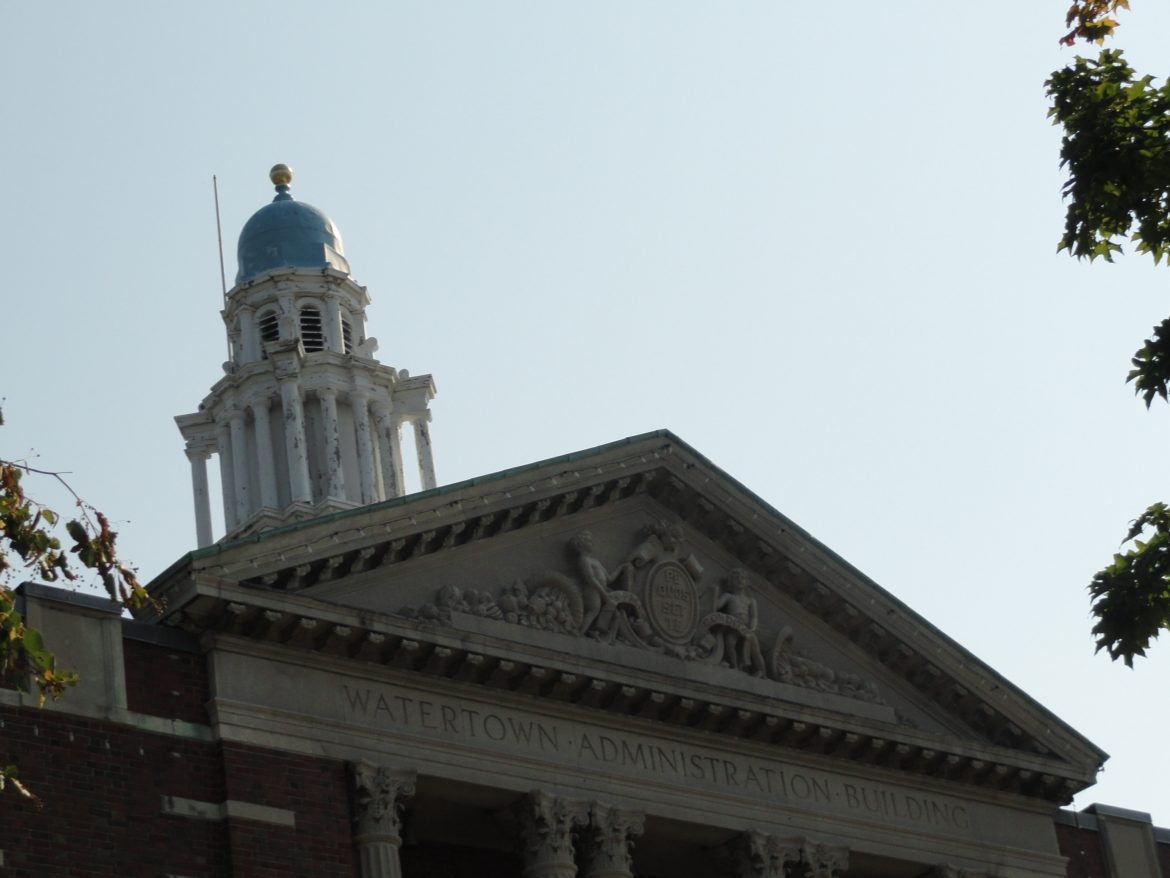
Charlie Breitrose
Watertown’s Town Hall.
A Town Council subcommittee approved the final draft for the rules on establishing the committee that will oversee the money brought in by the Community Preservation Act. The final draft eliminated some major portions of the previous version, but kept the main priorities.
Tuesday night, the Council’s Rules and Ordinances Committee voted to send the draft to the full Town Council, which includes the changed ordinance and the separate policy for appointing the Community Preservation Committee (CPC) members who are selected by the Town Council.
Each year the CPC will send to the Council a list of projects to be funded by the CPA funds. The state’s CPA statute allows the money, which comes from a 2 percent property tax surcharge, to be spent on affordable housing, open space or historical preservation. The state will provide some matching funds.
The CPC has two types of members, five members mandated by the state’s Community Preservation Act and four additional members. Much of the debate since the passage of the CPA has been how these additional members will be appointed.
Some called for them to be appointed like members of other voluntary boards in Watertown — by the Town Manager. Others, including those who put the CPA on the ballot, called for them to be appointed by a body representing the residents. They preferred that the Town Council choose the members. A compromise was made to have three members appointed by the Town Council and one by the Town Manager.
The Rules and Ordinances Committee has held a couple meetings to debate exactly how the Council’s appointments will be made.
The mandated CPC members are appointed by the following boards: Planning Board, Conservation Commission, Historical Commission, and Housing Authority. The fifth position is for the Board of Park Commissioners, which Watertown does not have, so the Town Manager will select a resident or employee “who acts in the capacity or performs like duties of a Board of Park Commissioners,” according to the ordinance.
The Changes
The subcommittee voted to remove the duties section of the ordinance, which covered eight paragraphs, and replace it with one paragraph referencing the powers and duties set out in the state’s statute, and referencing the section of Massachusetts General Law (G.L. c.44B, §5). A link to the state statute will also be included in the online version of the ordinance.
Town Councilor Anthony Donato, chair of the Rules and Ordinances subcommittee, noted that a significant amount of time was spent at previous meetings fine tuning parts of the duties section. Councilor Ken Woodland said that he thought listing all the duties was unnecessary.
“(Removing the duties) is what I suggested eight months ago,” Woodland said.
Another major change was removing from the ordinance the description of how the CPC members will be appointed by the Town Council. Instead it will be in a separate policy, Donato said.
The change was recommended by the Town’s attorney, Donato said, to create a simpler process when any changes are made to the process. If it remained in the ordinance, any change would require the Town Council to vote to make a change to the ordinance, and would require two meetings.
“I would hate for our hands to be tied,” Donato said. “We have already developed a process. It would be the same exact process, it’s just whether you do it in one document or two documents.”
Other minor edits and changes in wording were made to the ordinance.
The Appointment Process
The appointment policy also changed slightly, but the method of appointment was kept the same. Residents will be asked to send in an application with a cover letter and then each Town Councilor will chose their top five choices. The five applicants with the most support from the Council will be asked to come in to be interviewed by the full Town Council. In the case of a tie, more than five will be interviewed.
After the interviews, which will be lead by the Town Council President, each Councilor will select his or her top three applicants. If there is a tie, a second vote will be taken. If there is another tie, the appointment or appointments will be made by drawing names at random.
Other Debates
The subcommittee voted 2-1 to send the draft to the Town Council with Woodland voting against it. He said he prefers the Town Manager appointing all four of the CPC members not required by state statute.
He proposed an alternative draft of the ordinance which would have had the Town Manager appoint the four additional members, which lost 2-1. Councilor Lisa Feltner said, however, that she might be willing to support having the Town Manager make the appointments with the condition that no Town employees could serve on the CPC.
This statement caused an uproar in the Council Chambers, with supporters of the Town Council appointing the members objecting. Donato said that the charge given to the subcommittee was to come up with the process for the Council to appoint CPC members, so he suggested that if they want to pursue another alternative they could bring it up when the full Council considers the CPC ordinance and appointment policy.
Another debate arose over who would be able to serve as the Housing Authority representative. The Housing Authority has a board, which will make the appointment, but it is not clear if they can appoint an employee of the Housing Authority, such as the director.
Councilor Vincent Piccirilli, who attended Tuesday’s meeting, said the Housing Authority includes its director, so he believes the director can be appointed even if he or she does not live in Watertown. The current director, Brian Costello, does not live in town. Piccirilli suggested that the director has the most expertise on affordable housing.
Feltner said she has been in touch with the Secretary of State’s office and others and was told that an employee of the Housing Authority cannot be appointed to the CPC.
The Community Preservation Committee Ordinance and appointment policy will likely be discussed by the Town Council in May.
